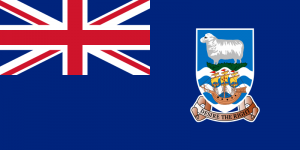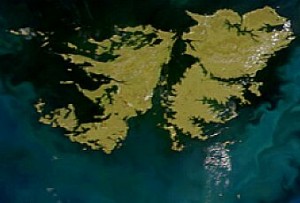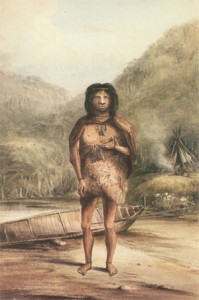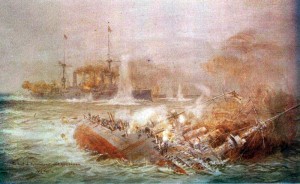Falkland Islands

Falkland Islands
The Falkland Islands are an archipelago located in the South Atlantic Ocean on the Patagonian Shelf. The principal islands are about 310 miles east of the Patagonian coast at a latitude of about 52°S. The archipelago which has an area of 4,700 square miles comprises East Falkland, West Falkland and 776 smaller islands. As a British Overseas Territory, the islands enjoy a large degree of internal self-governance with the United Kingdom guaranteeing good government and taking responsibility for their defence and foreign affairs. The islands’ capital is Stanley on East Falkland. Controversy exists over the Falklands’ original discovery and subsequent colonisation by Europeans. At various times, the islands have had French, British, Spanish, and Argentine settlements. Britain re-established its rule in 1833, though the islands continue to be claimed by Argentina. In 1982, following Argentina’s invasion of the islands, the two-month-long undeclared Falklands War between both countries resulted in the surrender of all Argentine forces and the return of the islands to British administration.
The Falkland Islands (/ˈfɔːlklənd/; Spanish: Islas Malvinas) are an archipelago located in the South Atlantic Ocean on the Patagonian Shelf. The principal islands are about 300 miles (500 kilometres) east of the Patagonian coast at a latitude of about 52°S. The archipelago, which has an area of 4,700 square miles (12,173 square kilometres), comprises East Falkland, West Falkland, and 776 smaller islands. As a British overseas territory, the islands enjoy a large degree of internal self-governance, with the United Kingdom guaranteeing good governanceand taking responsibility for their defence and foreign affairs. The islands’ capital is Stanley on East Falkland.
Controversy exists over the Falklands’ original discovery and subsequent colonisation by Europeans. At various times, the islands have had French, British,Spanish, and Argentine settlements. Britain re-established its rule in 1833, though Argentina maintained its claim to the islands. In 1982, following Argentina’s invasion of the islands, the two-month undeclared Falklands War between both countries resulted in the surrender of Argentine forces and the return of the islands to British administration.
The population, estimated at 2,932 in 2012, primarily consists of native Falkland Islanders, the majority of British descent. Other ethnicities include French, Gibraltarian, and Scandinavian. Immigration from the United Kingdom, Saint Helena, and Chile has reversed a population decline. The predominant and official language is English. Under the British Nationality (Falkland Islands) Act 1983, Falkland Islanders are legally British citizens.
The islands lie on the boundary of the subarctic and temperate maritime climate zones with both major islands having mountain ranges reaching to 2,300 feet (700 m). The islands are home to large bird populations, although many no longer breed on the main islands because of the effects of introduced species. Major economic activities include fishing, tourism, and sheep farming with an emphasis on high-quality wool exports. Oil exploration, licensed by the Falkland Islands Government, remains controversial as a result of maritime disputes with Argentina.
List of Falkland Islands Placenames
 Falkland Sound is the large strait running between the two larger islands.
Falkland Sound is the large strait running between the two larger islands.
The Falkland Islands are named after the Falkland Sound, a strait that separates the archipelago’s two main islands. The name “Falkland” was applied to the channel by John Strong, the captain of an English expedition that landed on the islands in 1690. Strong named the strait in honor of Anthony Cary, 5th Viscount of Falkland, the Treasurer of the Navy who had sponsored the long journey. The Viscount’s title originates from the town of Falkland, Scotland, whose name comes from the term “folkland” (meaning land held by folkright). The name would not be applied to the islands until 1765, when British captain John Byron claimed them for King George III as “Falkland’s Islands.”
The Spanish name for the archipelago, Islas Malvinas, is drawn from the FrenchÎles Malouines, the name given to the islands by French explorer Louis-Antoine de Bougainville in 1764. Bougainville, who founded the islands’ first settlement, named the area after the port of Saint-Malo, the point of departure for his ships and colonists. The port, located in the Brittany region of western France, was in turn named after St. Malo (or Maclou), the Christian evangelist who founded the city.
Philologist Félix Rodríguez González argues that, in the English language, the Spanish name functions “as a semiotic sign” with a prejudicial meaning. He bases his conclusion on “the general rejection of the [Spanish] name” by media in the United States and Britain during the Falklands War, adding that British newspaper The Guardian “[defied] national pride” when it “dared to call the islandsMalvinas.” The United Nations uses both the Spanish and English names; its official designation for the territory is “Falkland Islands (Malvinas).”
History of the Falkland Islands and Timeline of the History of the Falkland Islands
 Picture of a Fuegian (possibly a Yaghan) by ship’s artist Conrad Martens during a visit of HMS Beagle.
Picture of a Fuegian (possibly a Yaghan) by ship’s artist Conrad Martens during a visit of HMS Beagle.
Even though Fuegians from Patagonia possibly visited the Falkland Islands in prehistoric times, the islands were uninhabited at the time of European discovery. Discussion of the island’s discovery is filled with controversial claims dating back to the 16th century. No consensus exists in academia “if any of [the explorers] actually located the Falklands or other south Atlantic islands.” Regardless, the first recorded landing on the Falklands is attributed to English captain John Strong, who, while on a voyage “to the coast of Chile and Peru” in 1690, discovered the Falkland Sound and “noted the water and game on the islands.”
The Falklands remained uninhabited until two separate settlements, one established on East Falkland in 1764 by French captain Louis Antoine de Bougainville and the other founded on West Falkland in 1766 by British captain John MacBride, were established. The French and British settlements were possibly unaware of one another. After France “relinquished its rights [over the Falklands] to Spain” in 1766, the Spanish settled the islands in 1767. Problems began when Spain discovered the British settlement at Port Egmont; an imminent war, caused by Spain’s capture of the port in 1770, was avoided by the restitution of the settlement to Britain. The Falklands were again abandoned when the British evacuated them in 1774 and the Spanish followed suit in 1811, except for “a few gauchos and fishermen” who remained “to look after themselves.”
The status of the archipelago went unchecked until 1820, when American colonel David Jewett, a privateer working for the United Provinces of the Río de la Plata, informed “the more than 50 ships at anchor” about Buenos Aires‘ 1816 claim of possession “over Spain’s rights to the islands in the South Atlantic.” Owing to Jewett’s inability “to establish his authority over this hard-living crowd,” coupled with little emigration from Buenos Aires to the islands, the Falklands remained ungoverned until Luis Vernetre-established the old Spanish settlement under its former French name (Port Louis) in 1826. Vernet’s venture lasted until a dispute over fishing and hunting rights led to a raid by the USS Lexington in 1831, at which point the ship’s commander“declared the island government at an end.”
Buenos Aires attempted to reorganize its authority over the settlement by forming a garrison, but a mutiny of troops in 1832 was inadvertently followed the next year by the arrival of British forces who reasserted Britain’s rule. The Argentine Confederation, headed by Buenos Aires governor Juan Manuel de Rosas, protested Britain’s reacquisition of the Falklands, and Argentine governments since then have “continued to regularly register official protests against [Britain].” Regardless, the British troops soon departed, leaving the area “a kind of no man’s land” and returning months later to find the port ravaged by murder and looting. In 1840, the Falklands “officially became a Crown Colony,” and “a governor and a few Scotsmen arrived to establish a British pastoral settlement.” By 1844, “almost all settlers” relocated to Port Stanley, deemed an improved location for governance of the islands.
 Naval confrontation during the 1914 Battle of the Falkland Islands. Painting byWilliam Lionel Wyllie
Naval confrontation during the 1914 Battle of the Falkland Islands. Painting byWilliam Lionel Wyllie
In the first half of the 20th century, the Falklands “proved to be an important military base for controlling the South Atlantic during the two world wars”. A World War I naval encounter, the December 1914 Battle of the Falkland Islands, resulted in a British victory over imperial Germany. In World War II, “the same waters” hosted the December 1939 Battle of the River Plate, a victory of the Royal Navy over the Kriegsmarine.
Sovereignty of the Falklands again became an important issue in the second half of the 20th century, when Argentine president Juan Perón “asserted Argentine sovereignty” over the archipelago, causing a rise in tensions. The sovereignty dispute again intensified in the 1960’s, shortly after the United Nations passed a resolution on decolonization that Argentina identified as favorable to its position. Negotiations between the United Kingdom and Argentina failed to reach any meaningful conclusion. In 1982, the disagreement became an armed conflict when Argentina invaded the Falklands and other British territories in the South Atlantic, briefly occupying them until a UK expeditionary force retook the territories that same year.
After the war, the United Kingdom expanded its military presence on the islands, constructing RAF Mount Pleasant and increasing the garrison’s size. The UK and Argentina “normalized” diplomatic relations in 1990. In 1998, Argentine president Carlos Menem, in a letter to Falklanders, “called for reconciliation ‘to heal old wounds'”. Nevertheless, relations thereafter deteriorated because of air travel disagreements and the UK’s refusal to resume sovereignty negotiations “in the absence of evidence that the islanders themselves sought a change.” Ongoing disputes among the involved governments have led “some analysts [to] predict a growing conflict of interest between Argentina and Great Britain … because of the recent expansion of the fishing industry in the waters surrounding the Falklands.”


